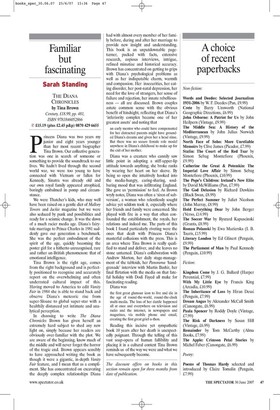Familiar but fascinating
Sarah Standing THE DIANA CHRONICLES by Tina Brown Century, £18.99, pp. 481, ISBN 9781846052866 £15.19 (plus £2.45 p&p) 0870 429 6655 princess Diana was two years my junior and eight years younger than her most recent biographer Tina Brown. Our collective generation was one in search of someone or something to provide the soundtrack to our lives. We hadn't lived through the second world war, we were too young to have connected with Vietnam or fallen for Kennedy, Sinatra was already old and our own royal family appeared atrophied, boringly embalmed in pomp and circumstance.
We were Thatcher's kids, who may well have been raised on a gentle diet of Mallory Towers and Jackie magazine but we were also seduced by punk and possibilities and ready for a seismic change. It was the dawn of a much racier media age. Diana's fairytale marriage to Prince Charles in 1981 suddenly gave our generation a benchmark. She was the perfect embodiment of the spirit of the age, quickly becoming the poster girl for a hitherto unrecognised, rare and rather un-British phenomenon: that of emotional intelligence.
Tina Brown is the right age, comes from the right background and is perfectly positioned to recognise and accurately report on the overwhelming and often underrated cultural impact of this. Having moved to America to edit Vanity Fair in 1984 she is able to stand back and observe Diana's meteoric rise from super-Sloane to global super-star with a healthily distanced yet intimate and analytical perception.
In choosing to write The Diana Chronicles Brown has given herself an extremely hard subject to shed any new light on, simply because her readers are obviously over-familiar with the plot. We are aware of the beginning, know much of the middle and will never forget the horror of the tragic end. Brown appears sensibly to have approached writing the book as though it were a gigantic, in-depth Vanity Fair feature, and I mean that as a compliment. She has concentrated on excavating the deeply complex relationships Diana had with almost every member of her family before, during and after her marriage to provide new insight and understanding. This book is an unputdownable pageturner, packed with facts, extensive research, copious interviews, intrigue, refined minutiae and historical accuracy. Brown has concentrated on getting to grips with Diana's psychological problems as well as her indisputable charm, warmth and compassion. Her insecurities, her eating disorder, her post-natal depression, her need for the love of strangers, her sense of failure and rejection, her innate rebelliousness — all are discussed. Brown couples astute common sense with the obvious benefit of hindsight, reflecting that Diana's 'inferiority complex became one of her greatest assets' and noting that an early mentor who could have compensated for her distracted parents might have grounded Diana's dreams and given her a head rinse. But there was no secure female role model anywhere in Diana's childhood to make up for the exit of her mother.
Diana was a creature who cannily saw little point in adopting a stiff-upper-lip attitude towards anything; she broke ranks by wearing her heart on her sleeve. By being so open she intuitively hooked into the media-hungry, caring-sharing, soulbaring mood that was infiltrating England. She gave us 'permission' to feel. As Brown wryly notes, Diana was often a 'siren of subversion', a woman who relentlessly sought advice yet seldom took it, especially where her friends and family were concerned. She played with fire in a way that often confounded the establishment, the royals, her relations and indeed me. The parts of this book I found particularly riveting were the ones that dealt with Princess Diana's masterful collusions with the press. This is an area where Tina Brown is really qualified to stand and deliver, and she leaves no stone unturned. Diana's collaboration with Andrew Morton, her daily stage-management of the tabloids, her Panorama 'handgrenade' interview with Martin Bashir, her final flirtation with the media on that fateful holiday with Dodi Fayed all make for fascinating reading.
Diana was the first great glamour icon to live and die in the age of round-the-world, round-the-clock multi-media. The loss of her dazzle happened all at once and everywhere on television and radio and the internet, in newspapers and magazines, via mobile phone and email, creating the first great grief-a-thon.
Reading this incisive yet sympathetic book 10 years after her death is unexpectedly poignant. Through the telling of this vast soap-opera of human fallibility and placing it in a cultural context Tina Brown reminds us of the way we were and what we have subsequently become.
The discount offers on books in this section remain open for three months from date of publication.


















































































 Previous page
Previous page